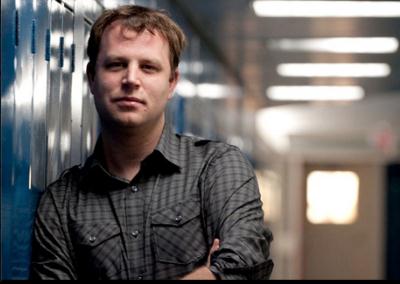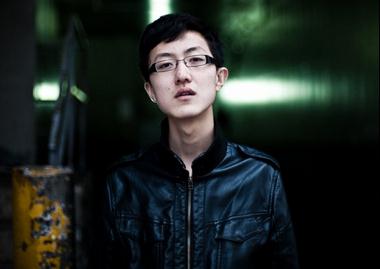
TDSB teacher Michael Erickson has some concerns about creating a queer-centric high school. Credit: Codi Wilson (courtesy of Erickson's Facebook)
The Toronto District School Board (TDSB) wants to know whether it should create a high school that encourages queer teachers and students to be out and proud.
A former student of the TDSB is hosting a community forum on Sept 26, entitled Have Your Say: A Queer-centric Secondary School in Toronto, to solicit community feedback.
The idea was first proposed by Fan Wu, 20, a University of Toronto student who graduated from Douglas Collegiate in 2010, and has been gaining support from members of the board.
Wu is working with the TDSB to spearhead the project.
“The idea was inspired by previous experiences in my life,” he says. “There is a real lack in education and a need for a school that encourages critical thinking, especially in areas of gender and sexual diversity.”
The school would include grades nine to 12, says Javier Davila, a teacher and advisor in the TDSB’s office for gender-based violence prevention. Davila is helping to organize the community forum as well as gathering support among board members.
While some schools are more queer-friendly than others, Wu says, most high schools don’t actively encourage lesbian, gay, bisexual and trans students or teachers to be out and proud.
“The gay teachers at my school made a point of not coming out to their students. Some only told students after they graduated,” he says. “Teachers are afraid of parental backlash, mostly. They were sensitive to the cultures of students, especially new Canadians, some of whom come from very conservative families.”
Some teachers who knew Wu’s sexuality made efforts to share books from queer writers, passed on to him like contraband, he recalls.
“I remember my writers’ craft teacher would slip me passages from queer writers, things that would inspire me that she would not give to the whole class,” he says. “I have always been attracted to queer writing and finding voices that I can relate to.”
Michael Erickson teaches at Harbord Collegiate and is one of the lead writers of the teachers’ guide “Challenging Homophobia and Heterosexism.” He says he would rather ensure that every TDSB school has queer-focused resources.
“I am concerned when we are pulling resources and goals into making one small space safe, as opposed to asking ourselves how that should look across the system,” he says. “What kind of student will self-select at 13, 14 or 15 years old? I think convincing teachers in schools to be integrating equity work is a better use of our resources.”
Ultimately, Davila agrees with Erickson. He would also like to see all schools incorporate queer studies, but that directive must come from the province, he says.
“I would also like to see [queer-centric education] implemented into the curriculum, but the curriculum comes from the Ministry of Education,” he says. “An alternative school has the option of looking at the curriculum through a different lens.”
Likewise, the Ontario curriculum can be interpreted differently in each school, he says.
The queer-centric school model would be similar to the TDSB Africentric high school launched last year at Winston Churchill Collegiate in Scarborough. Its goal is to create a culturally inspiring school environment for black youth, who are more likely to drop out of high school than almost any other group.
Erickson says he is also concerned a queer-centric school would inevitably become another Triangle Program, which is often called a “rescue school” for bullied queer youth.
“I worry that this is the wrong reaction to a very real problem,” he says. “We know that many queer and trans youth are kicked out of their homes, become homeless, fail entire school years, sometimes leave their schooling altogether, suffer mental health issues, stress or worse. And often the school itself is the source of the oppression.
“That’s what the Triangle Program is for. It’s a crisis intervention model.”
But Wu says he envisions a very different school than the TDSB’s Triangle Program.
“This is an entirely different concept than the Triangle Program,” he says. “It will be a school for not only those students disenfranchised at a regular school, but also for any student looking for empowerment education. All students would be welcome to learn from each others’ diverse experiences.”
For those students from homophobic and religious homes who want to attend, Wu hopes administration will help bridge the gap in cases where parents are less supportive.
“I hope to have a strong administrative staff that will be able to sit down and speak to those parents on a very individual level and try to understand where the parents’ fears and anxieties are coming from,” he says.
Still, he admits, in an ideal world, none of this would be necessary. Ontario would have one secular school system that doesn’t discriminate against youth from sexual minorities. Queer history, social justice activism and sexual- and gender-diversity studies would be incorporated into the provincial curriculum and integrated broadly into every course.
But right now, the education system is far from ideal, especially for queer youth. Even in Toronto’s most progressive schools, Wu says, queer youth remain “invisible.”
“The curriculum right now in high school is not designed to be reflexive,” he says. “Individual teachers may choose to make the effort to bring students non-Eurocentric and non-heteronormative materials, but the practice is not actively encouraged. And I don’t see that changing in the near future.”
The queer-centric school wouldn’t be a pathway to any specific career option; rather, it would provide another layer of critical thinking, he says. Students might choose to pursue careers in social justice, queer activism, sexuality or gender studies, or anti-oppression education in university.
“This will produce more well-informed graduates than a regular public school ever could,” Wu says.
After the community forum, an advisory committee will move the project forward. Applications for alternative schools must be submitted by the end of September.

 Why you can trust Xtra
Why you can trust Xtra


